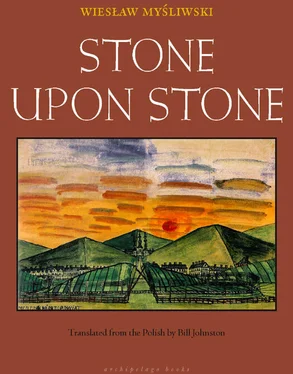They started hammering on the gate with their rifle butts. First, one of the servants came out, but he didn’t have a key. They shot him dead. Then the squire came with the key, but he couldn’t get the gate to open, he tried every which way but nothing worked. In the end he managed to unlock it. But they were furious at having had to wait so long, so they hung him. Though was it his fault the gate wouldn’t open? They hadn’t unlocked it since the war began. The young mistress had come back from her studies for good and now she just stayed home, which is to say at the manor. And when someone important came it would be on the quiet, and they used one of the side gates. So apparently the big gate was so rusty they couldn’t open it even after it was unlocked, and the hinges creaked so loud the bastard soldiers held their ears and stamped their feet. People said that God was protesting that way. But what could even God do about it when there were twenty truckloads of them, all armed to the teeth.
The gate is actually still standing today, except it’s in the middle of fields and it doesn’t lead anywhere. Because when they divvied up the manor lands after the war, there wasn’t so much as a fence post left. Folks cut down the trees in the grounds for building houses or for firewood. The same went for the avenue of lindens that led down to the gate. The manor house was demolished down to the foundations. And now it’s just fields like everywhere else. Wherever you look there’s rye, wheat, clover, barley, potatoes, beets, carrots. And the gateway, standing in the middle of the fields like someone just stuck it there because otherwise things would be too flat. Two tall gateposts joined at the top with a half-rounded arch where there used to be a lamp on a wrought-iron chain. That was where they hung the squire. The gates themselves were wrought iron as well, they had twisted designs with lilies and bindweed and vines or something. They always had to be opened by two men at once, one wouldn’t have been able to do it. And since then they were locked for good. Because when they took the squire’s body down someone locked the gate again, and the key disappeared.
After the war all kinds of people tried to open it. Some blacksmith guy, some cooper, a tiler, even a fellow that mended radios. Mechanics from the farmers’ circle, tractor drivers, all kinds of folks. It’s only natural, there’s never any lack of people that want to know what’s on the other side. One time somebody’s relative from America came and offered a hundred dollars to whoever could get it open. People started trying again. All sorts of different types rolled in from far and wide. To begin with, none of them had any luck. The relative from America was convinced it couldn’t be done, and he upped the offer to a hundred and fifty, then two hundred. And they got it open. What can money not do. Except that when they saw on the other side of the gate there was just grain and beets and carrots like everywhere else, they took fright and locked it up again so hard that the key twisted in the lock, and it stayed that way. And now it’s shut forever.
Not long ago a foreign tour was on its way to Kawęczyn by bus. When they saw the gateway in the middle of the fields they had the driver stop, and they got out and started laughing and laughing, saying what a strange country we were, building gateways in the middle of fields as if they led to mansions, when people could go any way they wanted around the gate. Kuśmierz from Jasień was plowing near the gateway, and they started taking photographs of him from every side as he worked. Then one of them gave him a pack of cigarettes. Kuśmierz didn’t want to take them because he didn’t know what he was being given them for, but one of the guys from the bus said:
“Gute Zigaretten.”
So he took them, but he lit up one of his own. Then they asked him:
“What’s this gateway? Did someone build it at the entrance to their field? Do you have to go through it when you’re sowing? Is that maybe a custom in these parts? Does it make your crops grow better? How much do you get per acre?”
But Kuśmierz didn’t tell them the truth. He thought to himself, they came all this way to visit us, they even gave him a pack of cigarettes, he’d feel kind of foolish telling them the truth. So he told them that no one built the gateway, that it grew there of its own accord. Because gateways like that, they grow around here, some places are thick with them. No one plants them or sows them, they just grow there like trees. The soil is rich, all it takes is for the wind to bring a seed or a bird to drop one from its beak. Around here you can find whole stands of gateways.
Three days they all hung there on the acacia trees, because the local village chairmen were forbidden to take them down for three days, the same for the squire in the gateway. Their hands were tied behind them with barbed wire, their feet were bare, all they had on were pants and shirts. Luckily it was a warm September, day after day the sun shone in a clear sky, there was gossamer floating in the air and the nights were mild. So at least they didn’t freeze like they would have if they’d been hanging in the rain and cold, at least they weren’t swung back and forth by the storm winds that often blow that time of year.
For the longest time after the war no one took that road to get to the market in Kawęczyn. They’d go through Zawady, though it was an extra four miles. Because all sorts of things happened to people when someone dug their heels in and insisted on riding that road, or taking it on foot. Sometimes, in the middle of the day they’d chance to look up and they’d see bare feet dangling among the leaves, or a rope with a big noose hanging from a branch. Or even the horses, you’d think they wouldn’t care about humans or the things that go on among them, but who knows if they don’t think humans are just like horses for them, just like they’re horses for people, in any case they’d prick up their ears and snort, and toss, and strain in the traces.
One farmer from Mikulczyce had a stallion black as a raven, with white fetlocks and a white flash on its forehead. Everyone envied him that stallion. When it was pulling his wagon it would hold its head up high and take short steps, like a young woman that’s trying to please the boys. The farmer never had to use the whip, he never had to call, whoa! or giddyup! like with other horses. He’d just hold the reins in his hand and give a slight tug, and the horse knew which way to go, left or right or straight on, at a trot. So the farmer reckoned a horse like that could go through hell and back, not just down the road to Kawęczyn. But when he started on that road, the horse suddenly reared up, and it wouldn’t budge an inch. The farmer gave it the whip on its legs and its back, god damn you, you this and you that, you think you’re getting any more oats you’re mistaken, it’ll be nothing but chaff from now on! But the horse just set off headlong across the fields. It tipped over the wagon, broke the shaft, the farmer messed up his back, and the horse ran all the way through one village and then the next and it probably would have kept running even farther, but its heart gave up and it fell down dead. Another guy rode that way on a pregnant mare, and everyone knows a pregnant mare is patient and obedient, it’ll go anywhere you tell it to. So it went down the road, but later it gave birth to a dead foal.
Or years after the war, the Sputnik was flying across the sky with a dog in it, when Drzazga was coming back from the district offices in Daszew. It was around noon. He was exhausted, because he’d waited forever at the offices and still not gotten what he wanted, so he sat under one of those acacia trees for a moment. Next to it there was the stump of another tree that had been cut down because it was too old. At one moment he looked over at the stump, and sitting on it there was a guy with a halter around his neck, barefoot, in pants and shirt, his hands tied behind with barbed wire, and he says to Drzazga:
Читать дальше












